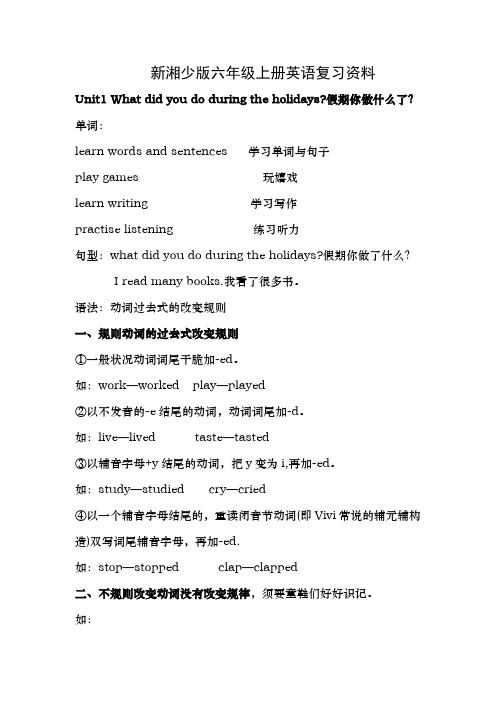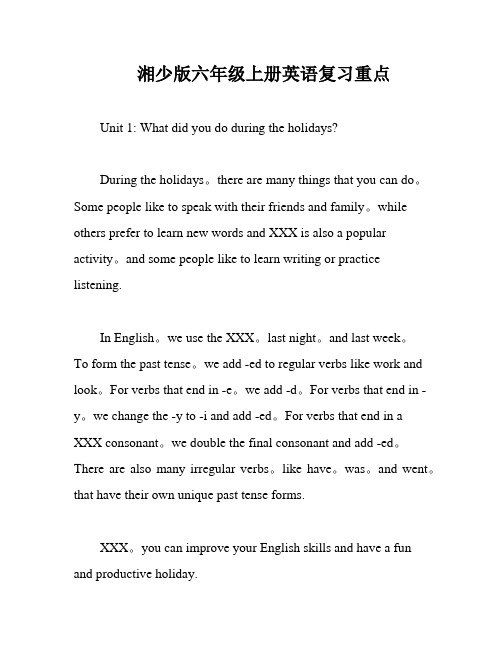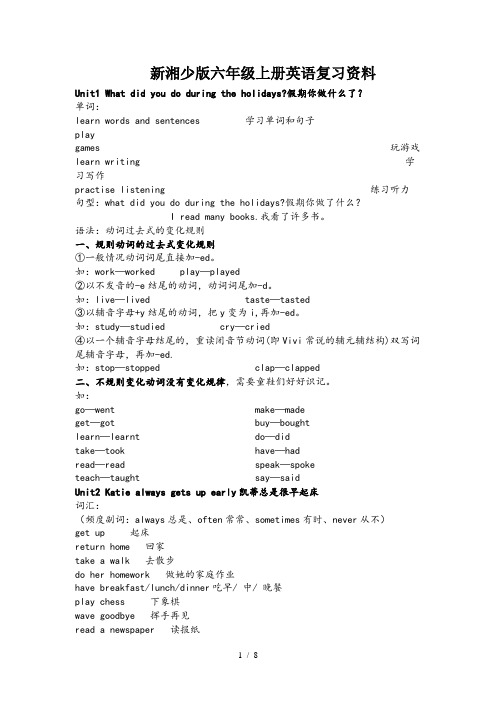湘少版六年级英语上册复习
新湘少版六年级上册英语复习资料全

新湘少版六年级上册英语复习资料Unit1 What did you do during the holidays?假期你做什么了?单词:learn words and sentences 学习单词与句子play games 玩嬉戏learn writing 学习写作practise listening 练习听力句型:what did you do during the holidays?假期你做了什么?I read many books.我看了很多书。
语法:动词过去式的改变规则一、规则动词的过去式改变规则①一般状况动词词尾干脆加-ed。
如:work—worked play—played②以不发音的-e结尾的动词,动词词尾加-d。
如:live—lived taste—tasted③以辅音字母+y结尾的动词,把y变为i,再加-ed。
如:study—studied cry—cried④以一个辅音字母结尾的,重读闭音节动词(即Vivi常说的辅元辅构造)双写词尾辅音字母,再加-ed.如:stop—stopped clap—clapped二、不规则改变动词没有改变规律,须要童鞋们好好识记。
如:go—went make—made get—got buy—bought learn—learnt do—didtake—took have—had read—read speak—spoke teach—taught say—saidUnit2 Katie always gets up early凯蒂总是很早起床词汇:(频度副词:always总是、often经常、sometimes有时、never 从不)get up 起床return home 回家take a walk 去漫步do her homework 做她的家庭作业have breakfast/lunch/dinner吃早/ 中/ 晚餐play chess 下象棋wave goodbye 挥手再见read a newspaper 读报纸be late for school 上学迟到句型:Peter always gets up at 7:00 a.m。
湘少版小学英语六年级复习知识点

湘少版小学英语六年级复习知识点文稿归稿存档编号:[KKUY-KKIO69-OTM243-OLUI129-G00I-FDQS58-湘少版(湖南少年儿童出版社出版)小学英语教材知识点,使用湘教版小学英语教材六年级(de)老师应该用得着,这些知识点还是很全面(de),希望对您有所帮助.1.字母:(大小)辨认、书写顺序;元音字母:A a , Ee, Ii, Oo, Uu2. 数字:1~999(de)基数词和序数词(de)运用,如计算、购物、时间、日期等.句型:①What's your number②What’s the time③How many pens are there④How old are you⑤How much is it⑥How tall are you⑦How heavy are you⑧What time do you get up⑨When's your birthday⑩What time did you see him3. 颜色:单词:red, pink, yellow, brown, blue, purple, orange, black, white, green.句型:①What colour is it②What’s your favourite colour4. 时间:年、季节、月、星期、日、时刻:Season( spring, summer, autumn, winter)Month: January, February, March, April, May, June, July, August, September, October, November, December.Week:Sunday, Monday, Tuesday, Wednesday, Thursday, Friday, Saturday.Day:1st May (the first of May), May 2nd ( May the second)句型:见话题2.5. 食品与饮料:人对食品与饮料(de)喜好;东西方食品.句型:①I like biscuits.②I’d like a cold drink.③Would you like some buns④Do you want some rice⑤This isn’t my food.6. 服装:服装(de)颜色:人对服装(de)喜好;某人(de)穿戴;所属关系;位置等.句型:①I like the green T-shirt.②Where’s my new cap③Who’s shirt is this④Is this your hat7.物品:名词(de)单、复数;特点、颜色、所属关系;存在(de)位置(in, on, under, beside, behind, in front of, above, near, inside, outside).玩具(toy car, doll, )文具(desk, book, bag ,pen, pencil, pencil-box, ruler, pencil sharpener,)句型:①What’s this②What colour is it③Whose is this④This is my brother’s painting.⑤I have a puppet.⑥There's a car near the hospital.⑦Was it in the wardrobe⑧Is there a book on the desk⑨That's not mine.8.动物和植物:cat, dog, duck, fish, sheep, bird, panda, monkey, rabbit, hen , cock, chick, tiger, lion, pig, cow , mouse (mice), elephant, ladybird, puppy, tree, flower, rose,9. 建筑与场所:factory, hospital, park, house, library, museum, office, farm, post office, bank, police station, railway station, bookstore, school, classroom, skating rink, café, house(ba throom, living-room, sitting-room, bedroom,kitchen),garden…10. 身体:head, hair, eye, nose, ear, mouth, neck, hand, finger, foot(feet) ,toe…外貌: fat, thin, tall, short, old, young, two big blue eyes, long hair, short hair, black hair. 句型:①This is my nose.②Touch your head.③Raise your arm.11. 个人情况:姓名、年龄、地址、特点与爱好.句型:①I'm twelve years old.②My hobby is reading.③I like music.④I'm interested in space.⑤My name is Peter.⑥I'm tall and thin.⑦Do you have any hobbies12. 家庭、亲属和朋友:姓名、年龄、地址、职业、特点与爱好、与你(de)关系family, grandfather(grandpa/granddad), grandmother(grandma/grand mum), father, mother, brother, sister, uncle, aunt, cousin, friend.句型:①Who's heHe's my father.②He's a doctor③He likes playing games.④My father helps me.⑤Is he a soldier⑥What’s he13. 学校:学校建筑和学校生活.school, classroom, library, playground, Chinese, maths , English, music, computer, PE, art, science,句型:①When do you go to school②What time do you have English14. 情绪和身体状态:happy, sad, tired, angry, shy, sorry, well, sick,句型:①I'm sick.②I'm happy.③We are sorry.④ I feel sad.15. 社交礼仪:礼貌用语;询问与应答.句型:问候①Hello./ Hi.②Good morning/afternoon/evening.③How are you ④How do you do⑤Glad to meet you./ Nice to meet you.介绍①My name is…②I’m a pupil.③I’m 12.④This is our teacher, Miss Chen.⑤He is from Japan.道别①Goodbye./Bye.②See you.③Good night.道谢①Thank you./Thanks.②You’re welcome.道歉①Sorry.②I’m sorry.③Excuse me.请求①Can I have a puppy ②Can I borrow a pencil ③Yes, please.④Of course.祝愿①Happy birthday.②Merry Christmas.提供帮助①Can I help you ②What can I do for you ③What’s the matter寻求帮助和建议①What can I do用餐①Do you want some soup ②Would you like some rice ③I'd like a cold drink.购物①Which one do you want ②Can I look at it ③I want a red one, please.④It's too expensive.⑤Have you got enough money⑥How much is it16.国家与国庆日:China, Japan, America (the USA), English( the UK), Australia, Russia, Canada, Singapore, India, France,句型:①When’s your country’s National Day②I come from China.17.天气与气候特征:hot, cold, cool, warm, sun, sunny, rain ,heavy rain, rainy, wind, strong wind,windy, snow , heavy snow, cloud, cloudy, …句型:①What's the weather like②It’s a cold day.③Spring is warm and nice.④Tomorrow will be rainy.⑤I like a sunny day.18. 节日:节日(de)特点;节日(de)活动.New Year's Day, Spring Festival, Children's Day, Mid-autumn Festival, Teachers' Day , National Day, Christmas Day, Dragon Boat Festival.19. 正在发生(de)事情:现在进行(de)动作和发生(de)事.句型:①Are you making a kite②Peter is writing.③What's Anne doing④Where are you going⑤What are they doing⑥Is he running20.日常生活:日常生活、工作、学习(de)活动.句型:①I come to school by bus.②Your homework is good.③What time do you get up④She always get up early.21. 计划与打算:计划和将要进行(de)动作be going to do …句型:①I’m/You’re /He’s/She’s /We’re/They’re (not) going to swim.②Are you going to swim③Is he/she going to visit Anne④What are you going to do⑤What is he going to do⑥When are they going to swim⑦Tomorrow will be rainy.⑧ I'll stay at home.22. 能力和可能:能做某事或可能进行某事.句型:①Can you read and write in English②Can I have a puppy③What can you do④She can run fast.23. 过去发生(de)事情或过去(de)打算:过去式.句型:①Where were you②Who was first③Was it in the wardrobe④Benny took my ball.⑤Where did you go⑥What did you do⑦I came by plane.⑧Anne wanted to skate.24. 对事物(de)比较:比较级和最高级.句型:①My singing is louder than yours.②I’m taller than you.③There more shops in Picture One.④Some stories are more interesting than others.⑤The most interesting stories.⑥Who is fatter25.提醒与告示:①What does that sign mean②Draw a cat on the roof.③Don't put your feet on the seat.④No speaking.⑤Do not go in.26.擅长和喜欢(de)事情:①I'm/ You're/ He's good at drawing.②I like playing basketball.。
湘少版六年级上册英语复习重点

湘少版六年级上册英语复习重点Unit 1: What did you do during the holidays?During the holidays。
there are many things that you can do。
Some people like to speak with their friends and family。
while others prefer to learn new words and XXX is also a popular activity。
and some people like to learn writing or practice listening.In English。
we use the XXX。
last night。
and last week。
To form the past tense。
we add -ed to regular verbs like work and look。
For verbs that end in -e。
we add -d。
For verbs that end in -y。
we change the -y to -i and add -ed。
For verbs that end in aXXX consonant。
we double the final consonant and add -ed。
There are also many irregular verbs。
like have。
was。
and went。
that have their own unique past tense forms.XXX。
you can improve your English skills and have a fun and productive holiday.During the holidays。
I XXX by train and bus。
新湘少版六年级上册英语复习资料

★单词、短语during 在…期间 holiday 假期learn words and sentences学习单词和句子 play games玩游戏learn writing学习写作 practice listening练习听力★句子时态:一般过去时,表示过去某个时间里发生的动作或存在的状态。
主要有动词的过去式来体现,其标志词是过去的时间。
如:yesterday昨天 last night昨晚 last week上周 last year 去年等等。
1. What did you do during the holidays 假期间你做了什么--I read many books./ I learnt writing. / I wrote a little storybook in English./ I visited my grandparents.Unit 2★单词、短语weekday工作日 after在…之后 before在..之前always总是,经常 often时常 sometimes有时 never从不wave goodbye挥手再见 be late for school上学迟到 read a newspaper读报纸play chess下棋 take a walk散步 get up起床 have/has breakfast吃早餐 return home回家★句子时态:一般现在时:表示经常,反复发生的动作或存在的状态。
常与always/often/sometimes/never/everday等时间状语连用。
一般人称做主语,谓语动词用原型。
当主语是第三人称单数时,谓语动词要加s或es. 第三人称单数主语包括(He,she,it以及单个名称)1. Katie always gets up early.2. She often does her homework before dinner.2. She sometimes plays chess with her father after dinner. 4. She never takesa walk.Unit 3★单词、短语world国家 email my friends给朋友发邮件 send greetings发送问候search for a lot of things查找许多东西 find out about countries查找国家★句子I like my computer.我喜欢我的电脑。
湘少版本小学六年级的上册的英语总结复习重点.doc

WORD格式小学英语六年级(上)复习资料Unit 1 What did you do during the holidays?●词汇 :holiday 假期 during 在 ... 期间learn words and 学习单词和句playsentences 子gameslearn 学习写practise 练习听力writing 作listening你在假期都做些什么?speak 说玩游戏●语法 : 一般过去时:表示过去某个时间里发生的动作或状态过去时判断标志:句子中有表示过去的时间。
yesterday 昨天 yesterday morning昨天早上the day before yesterda last night前天昨晚last week 上周last month 上个last justyear 去年now刚才月two days ago 两天前 in 等, .1990+ 动词过去.构成:主语式动词过去式的变化规则:1. 直接加ed : work—worked look—looked2.以不发音 e 结尾的单词,直接加d:live lived hope---hoped---use--- used3. 以辅音字母+y结尾y 为 i加的,变ed:study—studied carry—carriedworry—worried+ed: stop — stopped 4. 以重读闭音节结尾且末尾只有一个辅音字母的,双写最后的辅音字母 plan — planned; 重读闭音节体现形式为辅- 元 - 辅结构,例如nod,n为辅音,o为元音,d为辅音。
5. 以 ic结尾的动词,要ic变成再加ed,如→ picnicked,把ick picnic traffic→ trafficked6.不规则变化的动词过去式:have- am/is- was are- ge--- g ot fe ---felt go---went drink----- had -- -- were t say--- said el do/does---did drank eat--ate broughbring---- tthink- thought bought caught taugh--- buy---- catch---- teach---- twear-- wore cut---- cut swept sleep —----slept see-- sweep sawsitbecome-- read-- ----- became -- read - sat●语言结构:What did you do during the holidays?专业资料整理WORD格式I read many books.I wrote a little storybook.◆乘坐某种交通工具“ by+交通工具的名称” 如:乘火车by train乘公共汽车by bus但是,有一个特殊,步行on footUnit 2 Katie always gets up early.凯蒂总是很早起床。
湘少版六年级上册英语复习核心知识

湘少版六年级上册英语复习核心知识本文档旨在为六年级上册英语研究提供核心知识的复指南。
以下是需要重点复的内容:Unit 1: Greetings- 问候语:Hello, Hi, Good morning, Good afternoon, Good evening, How are you?- 回应问候:I'm fine, thank you. And you?- 自我介绍:My name is... I'm from...- 人称代词:I, you, he, she, it, we, theyUnit 2: Classroom Objects- 文具:pen, pencil, book, eraser, ruler, crayon- 研究用品:desk, chair, blackboard- 询问物品:What's this? It's a...- 形容词:big, small, long, short- 数字:one, two, three, four, five, six, seven, eight, nine, tenUnit 3: My Family- 家庭成员:father, mother, brother, sister, grandfather, grandmother- 家庭关系:This is my.../These are my...- 形容词性物主代词:my, your, his, her, its, our, theirUnit 4: Daily Routine- 动词:get up, wash face, brush teeth, have breakfast, go to school, have lunch, go home, do homework, have dinner, go to bed- 副词:early, late- 一般现在时:I get up at...Unit 5: Food and Drinks- 食物:apple, banana, sandwich, pizza- 饮品:water, juice, milk- 询问喜好:Do you like...? Yes, I do. / No, I don't.- 表达喜好:I like... / I don't like...Unit 6: Weather- 天气:sunny, cloudy, rainy, windy, snowy- 问天气:How's the weather today? It's...- 回答天气:It's sunny/cloudy/rainy/windy/snowy.以上是六年级上册英语复的核心知识点。
湘少版六年级上册英语知识点归纳

湘少版六年级上册英语知识点归纳湘少版六年级上册英语知识点归纳Unit 1一、核心词汇★★★1.动词:learn学习practise练习speak说2.名词:holiday假日;假期3.介词:during在....期间二、了解词汇★★1.动词:ring响2.名词:bell铃3.疑问副词:why为什么三、核心句型★★★1.I read many books during the holidays.我在假期里读了很多书。
解读:此句是一个含有一般过去时的陈述句。
一般过去时表示过去某时发生的动作或状态,常和表示过去的时间状语连用。
举一反三:I visited my uncle.我看望了我的叔叔。
I went to the park last Sunday.我上周日去公园了。
2.-What did you do during the holidays?你在假期里做了什么?-I learnt writing.我学习写作了。
解读:问句是一般过去时的特殊疑问句。
答语为一般过去时的陈述句。
举一反三:-What did you do yesterday?你昨天做什么了?-I played with my friends.我和我的朋友们玩了。
3.Why didn't you run around the tree?你为什么不绕着树跑?解读:此句是一个一般过去时的特殊疑问句,why为特殊疑问词,意为“为什么”,用于向对方询问原因,一般要用“Because..”来回答。
举一反三:Why didn't you go out to play?你为什么没有出去玩?四、了解句型★★1,The students are talking about their holidays.学生们正在讨论他们的假期。
解读:此句是一个现在进行时的陈述句。
现在进行时表示正在进行或发生的动作。
举一反三:He is watching TV.他正在看电视。
新湘少版六年级上册英语复习资料

新湘少版六年级上册英语复习资料Unit 1 ★动词过去式变化规律:1. 一般情况下,直接在动词词尾加ed. 如:talk—talked说listen—listened听play —played玩climb—climbed爬2. 以不发音的e结尾,在动词词尾加d. 如:practise—practised练习3. 以辅音字母加y结尾的动词,变y为i再加ed. 如:study—studied学习,研究4. 以一个辅音字母结尾的重读闭音节词,双写最后一个辅音字母,再加ed. 如:stop—stopped停止5. 不规则动词没有规律,需要特殊记。
如:do-did have—had go—went learn—learnt take—took read—read speak—spoke teach—taught stand—stood sit—sat say—said run—ran is, am—was are—were write--wrote★单词、短语during 在…期间holiday 假期learn words and sentences学习单词和句子play games玩游戏learn writing学习写作practice listening练习听力★句子时态:一般过去时,表示过去某个时间里发生的动作或存在的状态。
主要有动词的过去式来体现,其标志词是过去的时间。
如:yesterday昨天last night昨晚last week上周last year 去年等等。
1. What did you do during the holidays? 假期间你做了什么?--I read many books./ I learnt writing. / I wrote a little storybook in English./ I visited my grandparents.Unit 2 ★单词、短语weekday工作日after在…之后before在..之前always总是,经常often时常sometimes有时never从不wave goodbye挥手再见be late for school上学迟到read a newspaper读报纸play chess下棋take a walk散步get up起床have/has breakfast吃早餐return home回家Unit 3 ★单词、短语world国家email my friends给朋友发邮件send greetings发送问候search for a lot of things查找许多东西find out about countries查找国家★句子I like my computer.我喜欢我的电脑。
最新湘少版六年级上册英语复习重点

最新湘少版六年级上册英语复习重点Unit 1 What did you do during the holidays?During the holidays。
what did you do。
Did you learn new words and sentences。
Did you play games。
Did you learn writing。
Did you practice listening。
In grammar。
XXX in the past。
We can tell if a sentence is in the past tense if it includes words like "yesterday," "last night," "last week," "last month," "last year," "just now," "two days ago," "in 1990," and so on。
To form the simple past tense。
we add "-ed" to regular verbs。
For example。
"work" es "worked" and "look" es "looked." There are also some XXX't follow this rule。
such as "have/had," "am/is/was," "are/were," "get/got," "say/said," "XXX," "do/does/did," "go/went," "drink/drank," "eat/ate,""bring/brought," "think/thought," "buy/bought," "catch/caught," "teach/taught," "wear/wore," "cut/cut," "sweep/swept,""sleep/slept," and "see/saw."Let'XXX words related to the holidays: "holiday" means "a day or d of time when people don't go to work or school"。
湘少版六年级上册英语复习重点(精修版)

湘少版六年级上册英语复习重点(精修版)Unit 1 What did you do during the holidays?During the holidays。
we have a lot of free time to do different things。
Some people like to travel to different places。
while others prefer to stay at home and relax。
I did a lot of different XXX.Firstly。
XXX。
We had a lot of fun together.Secondly。
I learned how to write better。
I practiced writing different types of texts。
XXX I think my writing has improved a lot.Finally。
XXX。
It was a great way to XXX.Overall。
I had a great time during my holidays。
I learned a lot and had fun with my friends.Grammar: Past Simple XXXXXX indicate past time。
like yesterday。
last week。
or two days ago.To form the past simple tense。
we add -ed to regular verbs。
like worked or looked。
If the verb ends in -e。
we just add -d。
like in the word lived。
If the verb ends in a consonant + y。
湘少版六年级上册英语总复习

湘少班六年级上册英语复习Unit 1★动词过去式变化规律:1、一般情况下,直接在动词词尾加ed、如:talk—talked说listen—listened 听play—played玩climb—climbed爬2、以不发音得e结尾,在动词词尾加d、如:practise—practised练习3、以辅音字母加y结尾得动词,变y为i再加ed、如:study—studied学习,研究4、以一个辅音字母结尾得重读闭音节词,双写最后一个辅音字母,再加ed、如:stop—stopped停止5、不规则动词没有规律,需要特殊记。
如:do-didhave—hadgo—went learn—learn ttake—took read—read speak—spoke teach—taught stand—stood sit—sat say—said run—ran write--wrote is, am—wasare—were★单词、短语during 在…期间holiday 假期learn wordsandsentences学习单词与句子play games玩游戏learn writing学习写作practicelistening练习听力★句子时态:一般过去时,表示过去某个时间里发生得动作或存在得状态。
主要有动词得过去式来体现,其标志词就是过去得时间。
如:yesterday昨天last night昨晚last week上周lastyear去年等等。
1、What did you do during theholidays? 假期间您做了什么?--I read many books、/ Ilearntwriting、/ I wrote a little storybook in English、/I visited my grandparents、Unit 2★单词、短语weekday工作日after在…之后before在、、之前always总就是,经常often时常sometimes有时never从不wave goodbye挥手再见belate for school上学迟到read anewspaper读报纸play chess下棋take a walk散步get up起床have/hasbreakfast吃早餐return home回家★句子时态:一般现在时:表示经常,反复发生得动作或存在得状态。
湘少版英语六年级上册复习资料

湘少版六年级上册复习资料Unit 1 What did you do during the holidays?Words: during在....期间summer holidays暑假talk about谈论... speak说learn writing 学习写作play games玩游戏listen to music 听音乐holiday假期learn words and sentences学习单词write a story写故事practise listening 练习听力Sentences: What are you reading?你正在阅读什么?I’m reading an English storybook.我正在都一本英语故事书。
What did you do during the holidays?你在假期间做了什么?I learnt writing/read many books/ practised listening/ played games?我学习了写作/我读了很多书/我练习了听力/我玩了游戏。
Unit 2 Katie always gets up earlyWords: always总是often 经常sometimes 有时never从不wave goodbye挥手告别be late for school上学迟到do homework 做家庭作业read a newspaper 读报play chess下棋take a walk散步get up 起床return home 回家on weekdays 在平日go to school去上学Sentences:Katie always gets up early.凯蒂总是很早起床Katie often does her homework before dinner.凯蒂经常在晚饭前做家庭作业Katie sometimes plays chess with her father.凯蒂有时和她爸爸下棋Katie never takes a walk.凯蒂从不散步Unit3 I like my computerWords:Search for a lot of things find out about countries了解国家world 世界email my my friends 发邮件给朋友send greetings 送祝福interesting有趣的Sentences: We can email our friends on the computer.我们能在电脑上发邮件给朋友。
新湘少版六年级上册英语复习资料

新湘少版六年级上册英语复习资料Unit1 What did you do during the holidays?假期你做什么了?单词:learn words and sentences 学习单词和句子playgames 玩游戏learn writing 学习写作practise listening 练习听力句型:what did you do during the holidays?假期你做了什么?I read many books.我看了许多书。
语法:动词过去式的变化规则一、规则动词的过去式变化规则①一般情况动词词尾直接加-ed。
如:work—worked play—played②以不发音的-e结尾的动词,动词词尾加-d。
如:live—lived taste—tasted③以辅音字母+y结尾的动词,把y变为i,再加-ed。
如:study—studied cry—cried④以一个辅音字母结尾的,重读闭音节动词(即Vivi常说的辅元辅结构)双写词尾辅音字母,再加-ed.如:stop—stopped clap—clapped二、不规则变化动词没有变化规律,需要童鞋们好好识记。
如:go—went make—madeget—got buy—boughtlearn—learnt do—didtake—took have—hadread—read speak—spoketeach—taught say—saidUnit2 Katie always gets up early凯蒂总是很早起床词汇:(频度副词:always总是、often常常、sometimes有时、never从不)get up 起床return home 回家take a walk 去散步do her homework 做她的家庭作业have breakfast/lunch/dinner吃早/ 中/ 晚餐play chess 下象棋wave goodbye 挥手再见read a newspaper 读报纸be late for school 上学迟到句型:Peter always gets up at 7:00 a.m。
- 1、下载文档前请自行甄别文档内容的完整性,平台不提供额外的编辑、内容补充、找答案等附加服务。
- 2、"仅部分预览"的文档,不可在线预览部分如存在完整性等问题,可反馈申请退款(可完整预览的文档不适用该条件!)。
- 3、如文档侵犯您的权益,请联系客服反馈,我们会尽快为您处理(人工客服工作时间:9:00-18:30)。
Unit7 What can I do?我能做什么?
1.Lingling says,“I can ask Mum to make cake for them.”玲玲说,“我可以让妈妈为他们做蛋糕。
”
2.I can clean their houses.我能打扫房子。
3.I can help them on the road. 我能帮他们过马路。
4.I can help them to get on or off the bus. 我能帮他们上车或下车。
5.I can make them happy . 我能使他们高兴。
6.Let’s help the old people.I can sing to them .让我们去帮老人吧,我能唱歌给他们听。
Unit8 We shouldn’t waste water. 我们不应该浪费水资源。
1.You need water.Everyone needs water.你需要水,每个人都需要水。
2.We must save every drop of water.我们必须节约每一滴水。
3.We should plant more trees.我们应该种植更多的树。
4.We shouldn’t kill wild animals.我不应该杀害野生动物。
Unit9 This bird is bigger than the first one.
这只鸟比第一只鸟大。
1.Welcome to our clay art show.欢迎来到我们的陶艺展。
2.This is the second one.这是第二个
3.This bird is bigger than the first one.这只鸟比第一只大。
4.It’s the biggest.它是最大的。
5.Tom’s hair is shorter than Mike’s.汤姆的头发比麦克的短。
6.Peter can jump higher than David.彼得能跳的比大卫高。
Unit10 I don’t feel well today. 我感觉不舒服。
1.What‘s wrong with you?你怎么了?
2.I don’t feel well。
我感觉不舒服。
3.I feel cold and I have a cough。
我觉得很冷,我还感觉咳嗽。
4.I have a headache。
我头痛。
5.Drink more water。
多喝水。
6.Take some medicine and rest in bed。
吃些药并卧床休息。
Unit11 Shall we go to the theatre?我们能去剧院吗?①——Hello!Is that Anne?你好!你是安妮吗?
——Yes.This is Anne.是的。
我是安妮。
②——Shall we go to the cinema today?今天我们去电影院好吗?
——Well,it’s a good idea.噢,这是个好主意。
③——What time shall we meet? 我们几点见面?
——2:00 p.m.at Star Theatre. 下午两点在明星剧院。
④——Let’s go and see the play. 让我们去看戏吧。
——All right.好的。
Unit12 It’s Christmas again!又是圣诞节了!
①Anne’s family celebrates Christmas.安妮一家庆祝圣诞节。
②Anne and her mother decorate their Christmas tree with colourful balls and lights.安妮和她妈用彩球和灯装饰圣诞树。
③——Here’s a present for you.这是给你的礼物。
——Thank you,Mum. 谢谢妈妈。
新|课|标| 第|一| 网
④They give out small presents to children. 他们给孩子们分发小礼物。
⑤People send Christmas cards to their friends to wish them a merry Christmas.人们送圣诞卡给他们的朋友祝他们圣诞节快乐。
⑥——Merry Christmas! 圣诞节快乐!
——Merry Christmas to you,too!也祝你圣诞节快乐!。
